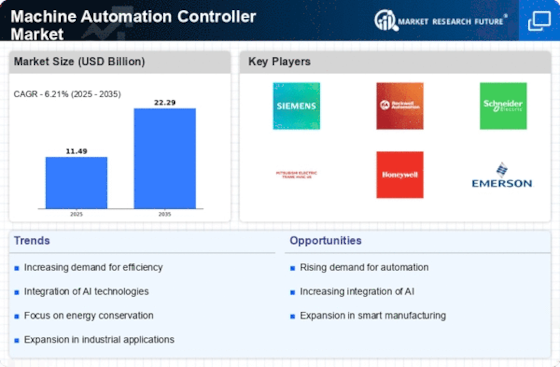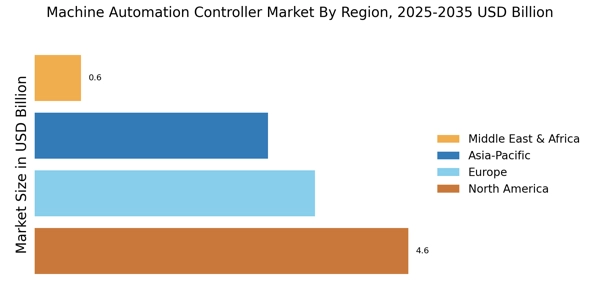Increased Focus on Safety and Compliance
The Machine Automation Controller Market is witnessing a heightened emphasis on safety and compliance standards across various sectors. As regulatory requirements become more stringent, manufacturers are compelled to adopt automation solutions that ensure adherence to safety protocols. Automation controllers are integral in monitoring and controlling processes to mitigate risks associated with human error. Recent statistics indicate that industries investing in safety automation technologies have seen a reduction in workplace accidents by up to 30%. This focus on safety not only protects employees but also enhances operational efficiency, making automation controllers indispensable. Furthermore, as companies strive to maintain compliance with international standards, the demand for reliable and robust machine automation controllers is expected to grow, reinforcing their critical role in modern manufacturing.
Emergence of Modular Automation Solutions
The Machine Automation Controller Market is experiencing a shift towards modular automation solutions, which offer flexibility and scalability to manufacturers. Modular systems allow companies to customize their automation setups according to specific needs, facilitating easier upgrades and maintenance. This trend is particularly appealing to small and medium-sized enterprises that may not have the resources for large-scale automation investments. Market data indicates that the modular automation segment is expected to grow at a rate of 6% annually, driven by the demand for adaptable manufacturing solutions. As industries seek to enhance their operational efficiency without incurring significant costs, the adoption of modular automation controllers is likely to rise. This shift not only supports innovation but also aligns with the broader trend of digital transformation in manufacturing.
Advancements in Robotics and AI Integration
The Machine Automation Controller Market is significantly influenced by advancements in robotics and artificial intelligence. The integration of AI into automation systems enhances the capabilities of machine controllers, allowing for more sophisticated decision-making processes. This trend is evident as industries adopt smart manufacturing practices, which are projected to account for a substantial portion of the market by 2026. The ability of automation controllers to process vast amounts of data in real-time enables manufacturers to optimize their operations and respond swiftly to market demands. Moreover, the collaboration between robotics and automation controllers is expected to create new opportunities for innovation, thereby driving market growth. As companies increasingly invest in AI-driven solutions, the demand for advanced machine automation controllers is anticipated to rise, reflecting a shift towards more intelligent manufacturing environments.
Rising Demand for Automation in Manufacturing
The Machine Automation Controller Market is experiencing a notable surge in demand due to the increasing need for automation in manufacturing processes. As industries strive for enhanced productivity and efficiency, automation controllers play a pivotal role in streamlining operations. According to recent data, the manufacturing sector is projected to grow at a compound annual growth rate of approximately 5.5% over the next five years. This growth is largely driven by the need for precision and consistency in production, which automation controllers facilitate. Furthermore, the integration of advanced technologies such as artificial intelligence and machine learning into automation systems is expected to further propel the market. As manufacturers seek to reduce operational costs and improve output quality, the reliance on machine automation controllers is likely to intensify.
Growing Adoption of Smart Manufacturing Practices
The Machine Automation Controller Market is being propelled by the growing adoption of smart manufacturing practices. As industries transition towards Industry 4.0, the need for interconnected and intelligent systems becomes paramount. Automation controllers serve as the backbone of these smart factories, enabling seamless communication between machines and systems. Recent market analyses suggest that the smart manufacturing sector is set to expand significantly, with automation technologies playing a crucial role in this transformation. The ability to collect and analyze data in real-time allows manufacturers to make informed decisions, optimize production processes, and enhance overall efficiency. As the trend towards smart manufacturing continues to gain momentum, the demand for advanced machine automation controllers is likely to increase, reflecting a shift towards more agile and responsive manufacturing environments.
















